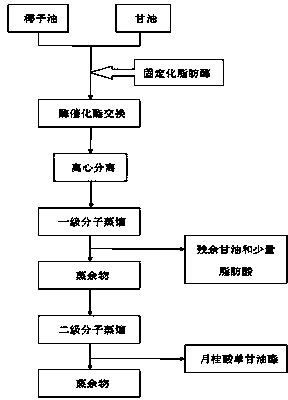Method for preparing lauric acid monoglyceride by immobilized lipase
A technology of immobilized lipase and lauric monoglyceride, which is applied in the field of preparation of lauric monoglyceride, can solve the problems of large acid-base salt discharge, non-recyclable, harsh reaction conditions, etc., and achieve resource and cost saving, The effect of low cost and mild reaction conditions
- Summary
- Abstract
- Description
- Claims
- Application Information
AI Technical Summary
Problems solved by technology
Method used
Image
Examples
Embodiment 1
[0024] (1) transesterification
[0025] Add 55.7 grams of coconut oil and 29.1 grams of glycerin into a 150mL flat-bottomed flask (the molar ratio of the two is 1:3, and the water content of glycerin is 4%). After the temperature (50°C), add 4.456g Novozym435 immobilized lipase (Novozymes) (the amount added is 8% of the weight of the above coconut oil), stir constantly, and continue to place it in the above constant temperature water bath for the transesterification reaction. Time 36h.
[0026] (2) centrifugal
[0027] The transesterification product obtained in step (1) is placed in a centrifuge with a centrifugal force of 5000g to separate the immobilized lipase and unreacted glycerin, and the upper oil phase is taken as a mixture of fatty acid glycerides.
[0028] (3) Primary molecular distillation
[0029] The fatty acid glyceride mixture obtained in step (2) is subjected to primary molecular distillation using a scraped-film short-range molecular distillation apparatus...
Embodiment 2
[0033] (1) transesterification
[0034] Add 55.7 grams of coconut oil and 38.8 grams of glycerin into a 150mL flat-bottomed flask (the molar ratio of the two is 1:4, and the water content of glycerin is 5%). After the temperature (40°C), add 3.342g LipozymeTLIM immobilized lipase (same as above) (addition amount is 6% of the weight of the above coconut oil), stir continuously, and continue to place in the above constant temperature water bath for transesterification reaction for 24 hours.
[0035] (2) centrifugal
[0036] The transesterification product obtained in step (1) is placed in a centrifuge with a centrifugal force of 5500g to separate the immobilized lipase and unreacted glycerin, and the upper oil phase is taken as a mixture of fatty acid glycerides.
[0037] (3) Primary molecular distillation
[0038] The fatty acid glyceride mixture obtained in step (2) is subjected to primary molecular distillation using a wiped-film short-range molecular distillation apparatus...
Embodiment 3
[0042] (1) transesterification
[0043] Add 55.7 grams of coconut oil and 38.8 grams of glycerin into a 150mL flat-bottomed flask (the molar ratio of the two is 1:4, and the water content of glycerin is 5%). After the temperature (40°C), add 2.785g LipozymeRMIM immobilized lipase (same as above) (the amount added is 5% of the weight of the above coconut oil), stir constantly, and continue to place it in the above constant temperature water bath for transesterification for 48 hours.
[0044] (2) centrifugal
[0045] The transesterification product obtained in step (1) is placed in a centrifuge with a centrifugal force of 5000g to separate the immobilized lipase and unreacted glycerin, and the upper oil phase is taken as a mixture of fatty acid glycerides.
[0046] (3) Primary molecular distillation
[0047]The fatty acid glyceride mixture obtained in step (2) is subjected to primary molecular distillation using a wiped-film short-range molecular distillation apparatus (same a...
PUM
 Login to View More
Login to View More Abstract
Description
Claims
Application Information
 Login to View More
Login to View More - R&D
- Intellectual Property
- Life Sciences
- Materials
- Tech Scout
- Unparalleled Data Quality
- Higher Quality Content
- 60% Fewer Hallucinations
Browse by: Latest US Patents, China's latest patents, Technical Efficacy Thesaurus, Application Domain, Technology Topic, Popular Technical Reports.
© 2025 PatSnap. All rights reserved.Legal|Privacy policy|Modern Slavery Act Transparency Statement|Sitemap|About US| Contact US: help@patsnap.com


